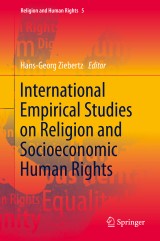Details

International Empirical Studies on Religion and Socioeconomic Human Rights
Religion and Human Rights, Band 5
|
96,29 € |
|
| Verlag: | Springer |
| Format: | |
| Veröffentl.: | 06.03.2020 |
| ISBN/EAN: | 9783030309343 |
| Sprache: | englisch |
Dieses eBook enthält ein Wasserzeichen.
Beschreibungen
<div><p>Socioeconomic rights include rights with regard to social security, labour and employment, as well as cultural rights which may be regarded as a shield for the protection of human dignity, especially of specific groups, such as women, children and refugees. The enforceability of socioeconomic rights clearly distinguishes them from other rights. These rights need, perhaps more than others, the support of civil society. Because states have leeway in how resources are distributed, civil society has a major impact on what resources are used to fulfil socio-economic rights. One of the actors in the public arena are religious traditions, respective Churches. Most of them have developed ethical standards for individual conduct and rules for living together in society based on their basic scriptures. All three monotheistic religions, Judaism, Christianity, and Islam, are marked by a caring engagement for the poor, the sick, the old and the foreign. </p>
From an empirical perspective,the general research question of this volume is how young people understand and evaluate socioeconomic rights and to which degree religious convictions and practices are connected with attitudes towards these human rights. Can religion be identified as a force supporting the human rights regime and which additional concepts strengthen or weaken the consent to these rights? The richness of empirical data contributes to a better understanding how socioeconomic rights are legitimated in the opinion of more than 10.000 respondents in 14 countries. </div><div><br></div>
From an empirical perspective,the general research question of this volume is how young people understand and evaluate socioeconomic rights and to which degree religious convictions and practices are connected with attitudes towards these human rights. Can religion be identified as a force supporting the human rights regime and which additional concepts strengthen or weaken the consent to these rights? The richness of empirical data contributes to a better understanding how socioeconomic rights are legitimated in the opinion of more than 10.000 respondents in 14 countries. </div><div><br></div>
Chapter 1. Introduction (Hans-Georg Ziebertz).- Chapter 2. Towards a legitimate Role of Religion in the Domain of Socio-economic Rights. An Empirical Study among Adolescents in North West European countries (Johannes A. van der Ven).- Chapter 3. Religion and socioeconomic rights among the youth of South Africa (Jaco Dreyer).- Chapter 4. Impact of religion on socioeconomic rights: An empirical study of Italian students’ attitudes (Francis-Vincent Anthony).- Chapter 5. An empirical study of religion and socio-economic rights amongst High-school learners in post-atheist, post-totalitarian Romania (Silviu Rogobete).- Chapter 6. Predictors of attitudes towards the right to work among youth in Georgia and Moldova (Alexander Unser).- Chapter 7. Religion and socio-economic human rights: An empirical enquiry among adolescents in England and Wales (Leslie J. Francis).- Chapter 8. The Right to Education in Tanzania and Nigeria: A Comparative Study (Clement Fumbo).- Chapter 9. Support for Women Rights? An empirical Study among young Germans (Hans-Georg Ziebertz).- Chapter 10. Religion and the Scandinavian Welfare State. Public support for socio-economic rights in times of migration (Pål Ketil Botvar).- Chapter 11. Religion and Attitude to Economic Deprivation Among Muslims: Checking the roles of Value Preference and Empathy (Uzeyir Ok).- Chapter 12. Young Palestinian Muslim Views on Socio-economic Human Rights (Raymond J. Webb).
Prof. Dr. Hans-Georg Ziebertz is Professor for Practical Theology, University of Würzburg, Germany. He is coordinator of the international research project “Religion and Human Rights”, many publications on these issues.
<p>Socioeconomic rights include rights with regard to social security, labour and employment, as well as cultural rights which may be regarded as a shield for the protection of human dignity, especially of specific groups, such as women, children and refugees. The enforceability of socioeconomic rights clearly distinguishes them from other rights. These rights need, perhaps more than others, the support of civil society. Because states have leeway in how resources are distributed, civil society has a major impact on what resources are used to fulfil socio-economic rights. One of the actors in the public arena are religious traditions, respective Churches. Most of them have developed ethical standards for individual conduct and rules for living together in society based on their basic scriptures. All three monotheistic religions, Judaism, Christianity, and Islam, are marked by a caring engagement for the poor, the sick, the old and the foreign. </p>
<p>From an empirical perspective, the general research question of this volume is how young people understand and evaluate socioeconomic rights and to which degree religious convictions and practices are connected with attitudes towards these human rights. Can religion be identified as a force supporting the human rights regime and which additional concepts strengthen or weaken the consent to these rights? The richness of empirical data contributes to a better understanding how socioeconomic rights are legitimated in the opinion of more than 10.000 respondents in 14 countries. </p>
<p>From an empirical perspective, the general research question of this volume is how young people understand and evaluate socioeconomic rights and to which degree religious convictions and practices are connected with attitudes towards these human rights. Can religion be identified as a force supporting the human rights regime and which additional concepts strengthen or weaken the consent to these rights? The richness of empirical data contributes to a better understanding how socioeconomic rights are legitimated in the opinion of more than 10.000 respondents in 14 countries. </p>
Provides empirical research on the acceptance, perception and legitimation of human rights from various religious and cultural backgrounds First book to rigorously tests for inter-individual differences regarding socioeconomic rights on religious grounds This books studies and reflects on factors that either induce or reduce agreement with human rights issues, more specifically with regard to socioeconomic human rights The book offers international comparative empirical research on human rights, not only focusing on the European context

















